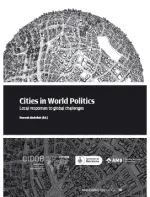La integración de políticas urbanas nacionales en África

Until recently most African governments were in denial about urbanisation. This stemmed from at least two factors. One, most political parties who come from a tradition of fighting an anti-colonial struggle for political independence hold a deep-seated attachment to the belief that “liberation” means a return to the land dispossessed from them by colonial powers. Two, the second green revolution and connective infrastructure (ports, roads, airports) were at the heart of the African renaissance discourse of the 1990s popularised by former presidents Thabo Mbeki and Olusegun Obesanjo. This dovetailed with the nostalgic ideological currents about land and placed all focus on Africa achieving its rightful place on the global (economic) stage through agricultural productivity and mineral beneficiation. And there was a critical political consideration as well: most opposition political forces were gaining support and influence in urban areas where democratic elections were being held, often displacing the ruling party from running municipalities in cities and towns. The most visceral expression of this deep-seated anti-urban bias was the commitment to stem rural-to-urban migration (Smit and Pieterse, 2014).